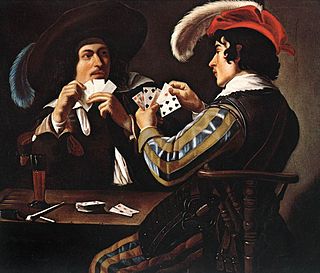
A trick-taking game is a card or tile-based game in which play of a hand centers on a series of finite rounds or units of play, called tricks, which are each evaluated to determine a winner or taker of that trick. The object of such games then may be closely tied to the number of tricks taken, as in plain-trick games such as Whist, Contract bridge, Spades, Napoleon, Euchre, Rowboat, Clubs and Spoil Five, or to the value of the cards contained in taken tricks, as in point-trick games such as Pinochle, the Tarot family, Mariage, Rook, All Fours, Manille, Briscola, and most evasion games like Hearts. The domino game Texas 42 is an example of a trick-taking game that is not a card game. Trick-and-draw games are trick-taking games in which the players can fill up their hands after each trick. In most variants, players are free to play any card into a trick in the first phase of the game, but must follow suit as soon as the stock is depleted. Trick-avoidance games like Reversis or Polignac are those in which the aim is to is avoid taking some or all tricks.
Ninety-nine is a card game for 2, 3, or 4 players. It is a trick-taking game that can use ordinary French-suited cards. Ninety-nine was created in 1967 by David Parlett; his goal was to have a good 3-player trick-taking game with simple rules yet great room for strategy.

Forty-Fives is a trick-taking card game that originated in Ireland. The game is popular in many communities throughout Atlantic Canada as well as the Gaspé Coast in Québec. Forty-fives is also played in parts of Massachusetts and southern New Hampshire in New England, United States, as well as in the South Island of New Zealand.
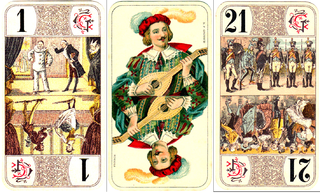
The French game of tarot, also jeu de tarot, is a trick-taking strategy tarot card game played by three to five players using a traditional 78-card tarot deck. The game is the second most popular card game in France and is also known in French-speaking Canada.
Belote is a 32-card, trick-taking, Ace-Ten game played primarily in France and certain European countries, namely Armenia, Bulgaria, Croatia, Cyprus, Greece, Moldova, North Macedonia and also in Saudi Arabia. It is one of the most popular card games in those countries, and the national card game of France, both casually and in gambling. It was invented around 1920 in France, and is a close relative of both Klaberjass and Klaverjas. Closely related games are played throughout the world. Definitive rules of the game were first published in 1921.
Pedreaux is an American trick-taking card game of the All Fours family based on Auction Pitch. Its most popular variant is known as Cinch, Double Pedro or High Five. Developed in Denver, Colorado, in the 1880s, it was soon regarded as the most important member of the All Fours family. Although it went out of fashion with the rise of Auction Bridge, it is still widely played on the western coast of the United States and in its southern states, being the dominant game in some locations in Louisiana. Forms of the game have been reported from Nicaragua, the Azores, Italy and Finland. The game is primarily played by four players in fixed partnerships, but can also be played by 2–6 individual players.
Pitch is an American trick-taking card game derived from the English game of All Fours. Historically, Pitch started as "Blind All Fours", a very simple All Fours variant that is still played in England as a pub game. The modern game involving a bidding phase and setting back a party's score if the bid is not reached came up in the middle of the 19th century and is more precisely known as Auction Pitch or Setback.
Whereas All Fours started as a two-player game, Pitch is most popular for three to five players. Four can play individually or in fixed partnerships, depending in part on regional preferences. Auction Pitch is played in numerous variations that vary the deck used, provide methods for improving players' hands, or expand the scoring system. Some of these variants gave rise to a new game known as Pedro or Cinch.

Sheng ji is a family of point-based, trick-taking card games played in China and in Chinese immigrant communities. They have a dynamic trump, i.e., which cards are trump changes every round. As these games are played over a wide area with no standardization, rules vary widely from region to region.
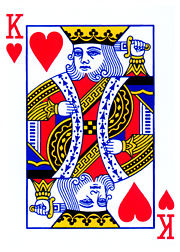
Barbu or Le Barbu, also known as Tafferan, is a trick-taking, compendium, card game similar to hearts where four players take turns leading seven different sub-games over the course of 28 deals. Barbu originated in France in the early 20th century where it was especially popular with university students, and became a prominent game among French Bridge-players in the 1960s. The French version of the game was originally played with a stripped deck of 32 cards ranked seven to ace in each suit. Modern forms are played with a full 52-card pack.
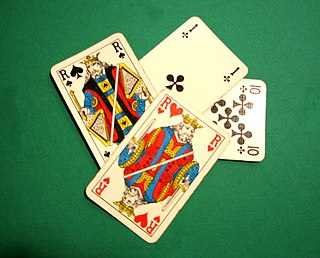
Twenty-eight, also called "twenty nine" in some places is an Indian trick-taking card game for four players, in which the Jack and the nine are the highest cards in every suit, followed by ace and ten. It is most popular in the South Indian state of Kerala. In Maharashtra state, this is also called as 304 which has similar rules but slightly different points system which adds up to 304. Founded by Chutney.

Botifarra is a point trick-taking card game for four players in fixed partnerships played in Catalonia, the Northeast country of Spain, and parts of Aragon and Castelló province. It is a historical game also played in many parts of Spain, not only in bars and coffee shops. The game is closely related to Manille from which it takes the mechanics, but its rules induce deduction and minimise the effects of luck.
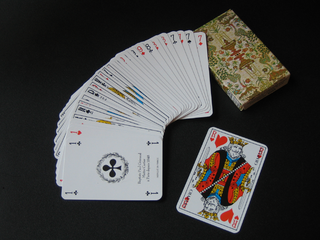
Manille is a French trick-taking card game which uses a 32 card deck. It spread to the rest of France in the early 20th century, but was subsequently checked and reversed by the expansion of Belote. It is still popular in France and the western part of Belgium.

This article deals with variations in game playing. For a description on variations in game rules and terminology, see Euchre variations.
Clag or Clagg is a trick-taking card game using a standard deck of 52 playing cards. It is similar to Whist or Oh Hell, and can be played with up to seven players.
Court piece or hokm is similar to the card game whist in which eldest hand makes trumps after the first five cards have been dealt, and trick-play is typically stopped after one party has won seven tricks. A special bonus is awarded if one party wins the first seven tricks, or even all tricks. The game is played by four players in two teams, but there are also adaptations for two or three players. Another similar game is known as Band Rung.
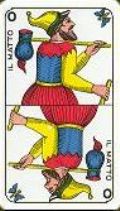
Scarto is a three player trick-taking tarot card game from Piedmont, Italy. It is a simple tarot game which can serve as an introduction to more complex tarot games. The name comes from the discarded cards that were exchanged with the stock, which is also the origin of the name for the Skat card game.

Officers' Skat (Offiziersskat), is a trick-taking card game for two players which is based on the rules of Skat. It may be played with a German or French card deck of 32 cards which, from the outset of the game, are laid out in rows both face down and face up. As in Skat, tricks are taken and card points counted to determine the winner of a round; game points are then awarded to decide the winner of a game. It is also called Two-hand Skat, Sailors' Skat (Seemannsskat), Farmers' Skat (Bauernskat), Robbers' Skat (Räuberskat) or Coachmen's Skat (Kutscherskat)
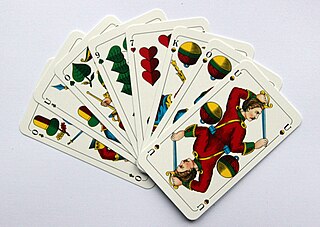
Mucken is a variation of the popular German card game, Schafkopf. However, unlike Schafkopf, it must always be played in teams of 2 players, so there are no Solo or Rufer (Caller) contracts. Mucken is mainly found in the province of Upper Franconia in the German state of Bavaria. Mucken is often played in Franconian restaurants, as it is part of the Franconian pub culture. The details of the rules vary greatly, even from village to village.

Zwanzigerrufen or Zwanz'gerrufen is the leading trick-taking card game of the Tarock family in many regions of eastern Austria. Its rules are simpler than the game of Königrufen which is more widely played in the whole of Austria. As is common in Tarock games, the cards have various point values – the primary goal in an individual game is to win the majority of points.
Zwanzig ab, 20 ab or simply Zwanzig is card game for four players. It is a member of the Rams family in which the key feature is that players may choose to drop out of the game if they believe their hand is not strong enough to take a minimum number of tricks. It appears to be a recent, internet-propagated variant of Schnalzen. However, the latter has a natural card ranking, it played with double German cards and a Weli, has no exchanging and has a different scoring schema.
